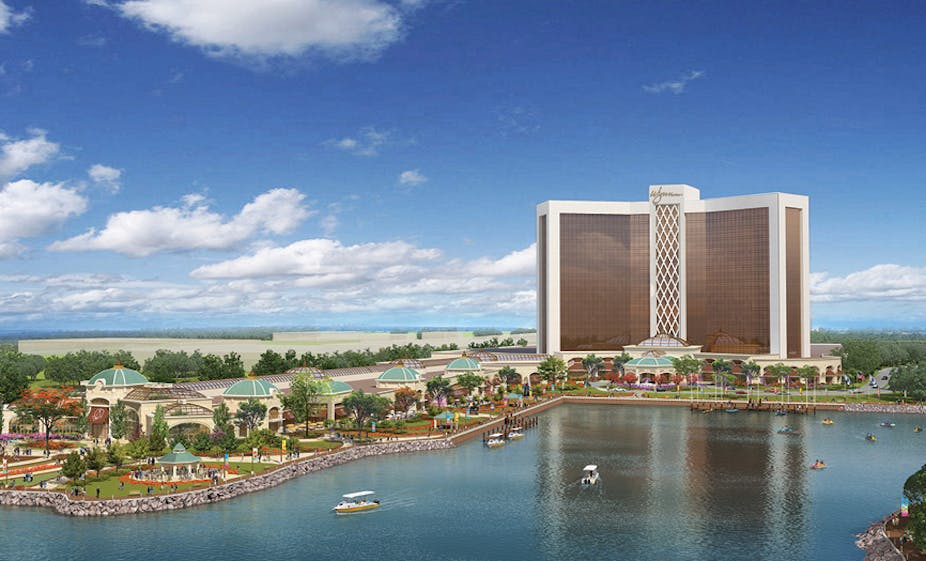The [upcoming vote](http://ballotpedia.org/Massachusetts_Casino_Repeal_Initiative,Question_3(2014) on whether to scrap plans to allow casino resorts in Massachusetts fits into a broader pattern of individuals and pressure groups resisting the expansion of commercial gambling in both the US and abroad.
The reaction comes after three decades of states around the world legislating to introduce more sophisticated and pervasive forms of gambling, in a move that marries the revenue needs of governments with the industry’s desire for profits.
This mutually beneficial relationship between states and gambling has created a powerful multi-national industry equivalent in scale to Big Tobacco, which researchers recently dubbed “Big Gambling.”
Proponents of gambling, and particularly large casinos, argue that increased taxes, as well as job and wealth creation, contribute to the revitalization of local economies and pay for a range of important public services.
Such a case has been made for the planned resort casino in Boston, with supporters emphasizing the boost to tourism and the creation of local jobs and a transport infrastructure that the billion dollar venture would bring.
However, critics point out that gambling only redistributes existing money, but does not generate much new wealth. In fact, it can have a detrimental effect on the surrounding economy as leisure spending is diverted away from local businesses. Every dollar spent in a casino is a dollar that might have been spent in local restaurants, cinemas or shops.
Casinos tend only to deliver economic benefits when they attract international high-rollers rather than locals. High-rollers spend – and lose – large sums of money that benefit the region. Locals, by contrast, simply deplete the more limited resources of residents, to the cost of the local economy as a whole. Australian research, for example, has found that only around 5% of Australian casino customers are international tourists, contributing some 18% of revenue, while locals make up the majority of players – as well as the majority of revenue.
Problem gambling
Alongside these (contested) economic benefits, researchers have shown that the growth of commercial gambling also brings a range of negative impacts for individuals, their families and communities.
Problem and pathological gambling has been recognised as a mental health issue since the 1980s, and was recently re-categorised by the American Psychiatric Association as an addiction. Surveys from around the world estimate that between 0.6 and 4% of people experience problems with gambling, with the highest figures concentrated among the economically disadvantaged, ethnic minorities and the young.

Although these numbers may appear relatively small, such players account for a large proportion of gambling losses, with some studies suggesting that between a third and a half of casino profits come from this group.
Those suffering from gambling problems experience debt, bankruptcy, the loss of their jobs, homes and relationships, as well as depression and suicide.
My own research has shown that the problems associated with gambling extend well beyond the individual, and ripple out to affect their wider families, workplaces and communities.
The loss of money and time involved in excess gambling impacts gamblers’ social relationships in a range of ways. Relationships and marriages can be undermined or destroyed through lack of trust and loss of shared funds. Workplaces suffer from employee absenteeism, lost productivity and fraud, while the children of people with gambling problems do less well at school, and are more likely to truant and develop gambling problems themselves as they get older.
Research carried out in the US has found that proximity to casinos increases the levels of these problems in the local population, with those living within ten miles of a casino having approximately double the rates of gambling problems than those who live further afield.
Certain games are more strongly associated with these kinds of negative social impacts than others; in particular electronic gaming machines which have a high “event frequency” which makes it possible to bet – and lose – very quickly.
A tax on the poor
Western-style casinos, such as the one proposed in Massachusetts, are dominated by these machines, which account for some 40% of casino profits, as well as a contributing to high levels of problem gambling.
As the National Gambling Impact Study Commission found, the expansion of gambling when a new casino comes into town is seen by some residents as undermining the quality of life, damaging local businesses and bringing about increased levels of crime, traffic and anti-social behaviour.
Research from Australia, Great Britain and America has also consistently shown that it is low income and ethnic minority groups and communities who are most affected by the global spread of gambling.
Such a distribution reveals that the revenue raised through gambling is a highly regressive, and damaging, form of taxation.
It is against this backdrop that groups and communities have begun to mobilize to counter the spread of gambling. Massachusetts’ “Repeal the Casino Deal” group has its counterpart in Britain’s “Campaign for Fairer Gambling”, and Australian politician Nick Xenophon’s single ticket “no pokies” policy. (“Pokies” is the Australian term for slot machines.)
As awareness of negative social impacts grows, local resistance is increasingly demanding that legislatures re-think the consequences of the global expansion of gambling.
This article is part of a series on gambling in America. You can read the rest of the series here.

